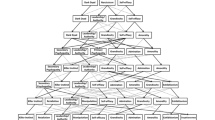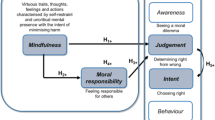Abstract
As part of its evolving notions of self, contemporary Western culture has come to regard integrity as a preeminent public and private virtue. The meanings now given to integrity appear to cluster around its form, which is personal coherence, and its content, which is standing for something important. Building on Stephen Carter's explication of integrity, and in response to its veneration as a moral panacea, three limitations of integrity are discussed. First, integrity does not guarantee that right and wrong have actually been discerned, only that an attempt has been made, that moral reflection has occurred. Second, integrity does not necessarily engender or even preserve interpersonal peace, but instead frequently causes conflict it is then unable to resolve. Third, integrity does not always precipitate or prevent the reform of social structures and organizations, because it remains subject to the exercise of interpersonal power.
Similar content being viewed by others
References
Bennett, W. (Ed.). (1993). The book of virtues. New York: Simon & Schuster.
Calhoun, C. (1998). Standing for something. In G. L. Bowie, M. W. Michaels, & K. Higgins (Eds.), Thirteen questions in ethics and social philosophy (2nd ed.) (pp. 17–22). Orlando: Harcourt Brace.
Carter, S. L. (1996). Integrity. New York: HarperCollins.
Dyer, C. H. (1997). The power of personal integrity. Carol Stream, IL: Tyndale House.
Engstrom, T. W. (1987). Integrity. Waco, TX: Word Books.
Fackler, M., & Bunn, C. (1998). Is it ever right to do a wrong? Discipleship Journal, 104, 39–42.
Fineman, H. (1994). The virtuecrats. Newsweek, June 13, 31.
Gaede, S.D. (1993). When tolerance is no virtue: Political correctness, multiculturalism, and the future of truth and justice. Downers Grove, IL: InterVarsity Press.
Gergen, K. (1998). The dissolution of the self. In S. E. Cahill (Ed.), Inside social life: Readings in sociological psychology and microsociology (pp. 302–308). Los Angeles: Roxbury Publishing.
Grenz, S. (1997). The moral quest: Foundations of Christian ethics. Downers Grove, IL: InterVarsity Press.
Himmelfarb, G. (1994). The demoralization of society: From Victorian virtues to modern values. New York: Vantage Press.
Hochschild, A. R. (1983). The managed heart. Berkeley: University of California Press.
James, W. (1915). Psychology. New York: Holt, Rinehart & Winston.
King, Martin Luther. (1963). Letter from Birmingham City Jail. April 16.
Kreeft, P. (1992). Back to virtue. San Francisco: Ignatius.
Lear, J. (1988). Aristotle: The desire to understand. Cambridge: Cambridge University Press.
Lee, C. (1998). Beyond family values: A call to Christian virtue. Downers Grove, IL: InterVarsity Press.
MacArthur, J. F. (1997). The power of integrity: Building a life without compromise. Wheaton, IL: Crossway Books.
MacIntyre, A. (1981). After virtue: A study in moral theory. South Bend, IN: University of Notre Dame Press.
MacIntyre, A. (1988). Whose justice? Which rationality? South Bend, IN: University of Notre Dame Press.
McFall, L. (1998). Integrity. In G. L. Bowie, M. W. Michaels, & K. Higgins (Eds.), Thirteen questions in ethics and social philosophy (2nd ed.) (pp. 11–16). Orlando: Harcourt Brace.
McGrath, A. E. (1999). Science and religion: An introduction. Oxford: Blackwell Publishers.
Middleton, J. R. & Walsh, B. J. (1995). Truth is stranger than it used to be: Biblical faith in a postmodern age. Downers Grove, IL: InterVarsity Press.
Pascal, B. Pensees. Sec. V, No. 298.
Sell, A. P. F. (1990). Aspects of Christian integrity. Calgary: University of Calgary Press.
Seven promises of a promise keeper. (1994). Colorado Springs, CO: Focus on the Family Publishing.
Swindoll, C. R. (1995). Integrity. New York: HarperCollins.
Taylor, C. (1989). Sources of the self: The making of the modern identity. Princeton, NJ: Princeton University Press.
Trilling, L. (1972). Sincerity and authenticity. Cambridge, MA: Harvard University Press.
Veith, G. E. (1994). Postmodern times: A Christian guide to contemporary thought and culture. Wheaton, IL: Crossway Books.
Weber, M. (1963). The sociology of religion. (Ephraim Fischoff, Trans.) Boston: Beacon Press. (Original work published 1922)
Weber, M. (1968). Economy and society. 3 vols. Totowa, N.J.: Bedminster Press. (Original work published 1921)
White, J. (1998). The power of integrity. Discipleship Journal, 104, 33–37.




